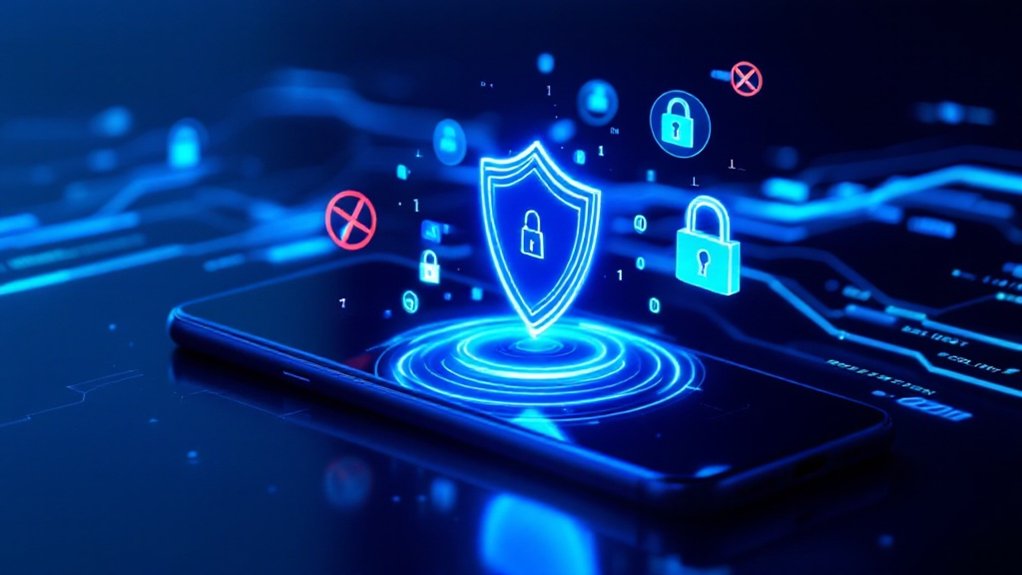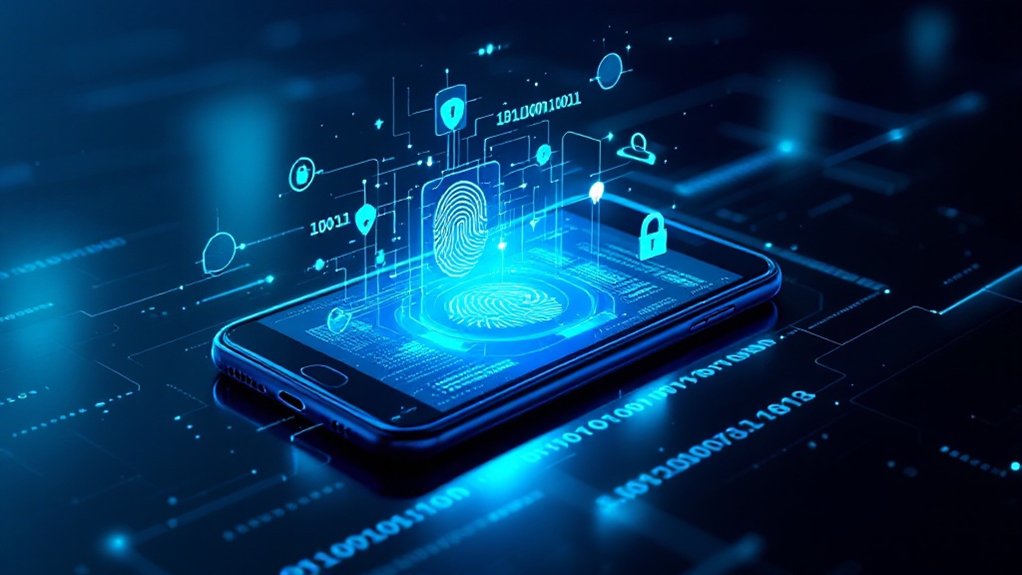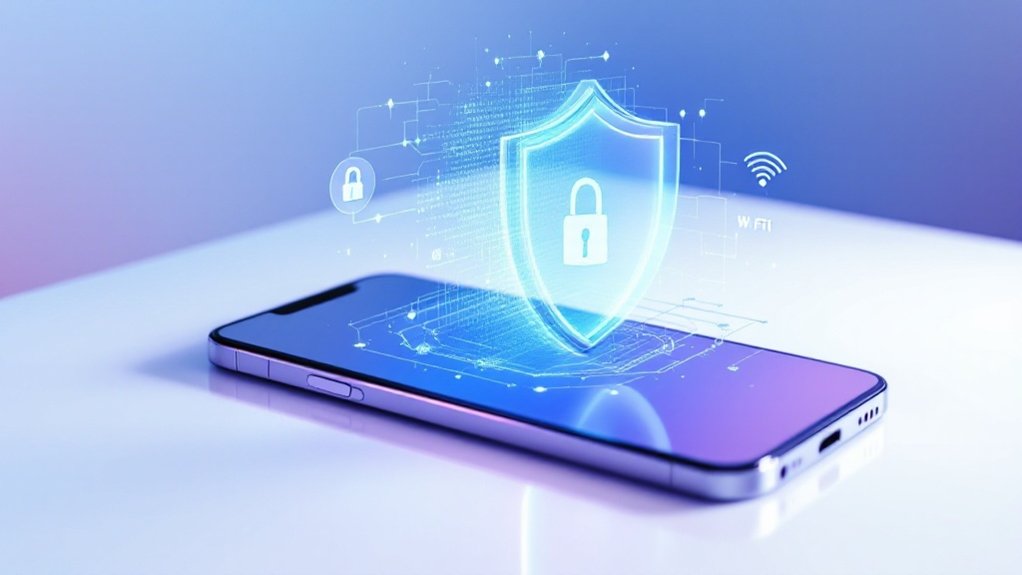To combat phone hackers, users must implement multiple security measures, including regular software updates, strong authentication methods, and careful app management. Installing reputable antivirus software, conducting malware scans, and enabling two-factor authentication provide fundamental protection against cyber threats. Monitoring device behavior, removing suspicious applications, and exercising caution on public networks are significant steps. With mobile malware attacks rising 46% since 2020, understanding all-encompassing security strategies has become increasingly important for device protection.

Mobile device security has become increasingly important as cybercriminals develop sophisticated methods to breach smartphones and tablets, with experts reporting a 46% rise in mobile malware attacks since 2020.
Security analysts highlight that maintaining up-to-date software serves as the first line of defense, requiring users to quickly install operating system updates and security patches as they utilize strong authentication methods, including biometric verification and two-factor authentication protocols. Suspicious apps can cause slow device performance, making it critical to monitor your phone’s behavior.
Device hygiene plays a vital role in preventing unauthorized access, necessitating regular removal of suspicious applications and careful management of app permissions. Users must exercise vigilance when downloading applications, restricting their sources to official app stores and systematically reviewing and revoking unnecessary permissions that could compromise device security. The risk of downloading from unofficial sources significantly increases chances of installing malicious third-party apps.
Implementation of extensive security measures includes installing reputable antivirus software and conducting regular malware scans. Android users benefit from Google’s Play Protect system, while iOS users can take advantage of built-in security features such as Find My iPhone. Real-time protection from security software like Malwarebytes can help detect and block emerging threats instantly.
These tools, combined with routine network vulnerability assessments, create a strong security framework for mobile devices.
Data protection requires a multi-faceted approach, incorporating encryption for both stored data and backups. Security experts recommend utilizing password managers for credential storage and enabling remote wiping capabilities to protect sensitive information in case of device theft or loss.
Regular data backups ensure minimal disruption if security measures are compromised.
Safe browsing practices remain critical for mobile security, with users advised to exercise caution when connecting to public Wi-Fi networks by utilizing VPN services.
Vigilance regarding phishing attempts through email and SMS communications helps prevent unauthorized access to personal information and accounts.
Users must remain alert to potential security breaches by monitoring for unusual device behavior, including excessive battery drain, unexpected performance issues, or abnormal data usage patterns.
Upon detecting suspicious activity, immediate action should include changing passwords, securing SIM cards through carrier intervention, and potentially performing factory resets to eliminate malware.
In severe cases, professional security assessment services may be necessary to guarantee complete removal of security threats.
Frequently Asked Questions
Can Hackers Access My Phone Through Bluetooth When It’s Turned Off?
Recent security research demonstrates that hackers can potentially access phones through Bluetooth even when powered off, particularly on iPhones.
This vulnerability exists due to certain wireless modules, including Bluetooth and Find My network features, remain partially active in low-power mode after shutdown.
The risk stems from unencrypted Bluetooth firmware that could be exploited to inject malicious code, potentially compromising virtual car keys and payment data.
How Long Does It Take for a Hacker to Break Into Phones?
Statistics indicate that hackers can potentially breach a mobile device within minutes to several days, depending on security measures and attack methods.
According to cybersecurity data, brute force attacks on weak passwords can succeed within 24 hours, whereas sophisticated malware deployment typically requires 194-277 days to detect.
Advanced persistent threats utilizing stolen credentials average 88 days to achieve full system compromise, with external actors responsible for 65% of breaches.
Will Airplane Mode Completely Protect My Phone From Hackers?
Airplane mode provides limited protection against hackers by disabling wireless communications but does not offer complete security.
Although it prevents real-time attacks through cellular networks, Wi-Fi, and Bluetooth connections, existing malware remains active, and physical device access is still possible.
Security experts highlight that airplane mode should be combined with additional measures, including strong passwords, updated software, antivirus protection, and regular security audits for thorough device protection.
Can Hackers Still Track My Location if I Remove My SIM Card?
Removing a SIM card does not prevent location tracking, as hackers can still exploit multiple vulnerabilities.
GPS functionality remains active without a SIM, whereas Wi-Fi networks and Bluetooth signals can triangulate position.
Device IMEI numbers continue broadcasting to nearby cell towers, and pre-installed malware may access location data independently.
Moreover, social media activity and IP addresses can reveal geographical coordinates, even without cellular connectivity.
Do Phone Cases With RFID Protection Prevent Hackers From Accessing My Device?
RFID-blocking phone cases do not prevent hackers from accessing mobile devices, as phone hacking primarily occurs through software vulnerabilities rather than RFID scanning.
Although these cases can block short-range radio signals used in contactless payments, they offer no protection against common cyber threats like malware, phishing attacks, or network exploits.
Security experts highlight that effective phone protection requires software updates, strong passwords, and careful monitoring of app permissions.









